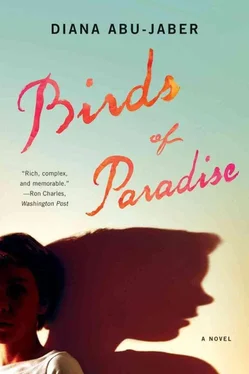Still, concerns flitter over him, embedded in the light racing through the car windows: a tricky application for a variance, half-written contracts, permeable wording. They used to be judicious, PI&B — especially compared with other developers — they were strategic and deliberate in the way they picked sites and new projects, but over the past five years (he gazes over the bay at a creamy 38-foot Hinckley): poor workmanship, substandard materials. Lately, PI&B has focused on tear-downs — on the Beach, in the Grove, the Gables, and downtown — throwing up buildings one after another. Parkhurst and his clients rush into board meetings clutching MLS printouts, sweating through the armpits of their jackets. ’05’s been the wildest yet — even now in the thick of hurricane season. Exciting if you can stand the exposure. After Hurricane Andrew, and last year, an iron lashing from Hurricane Charley, he’d thought investors would cool off on South Florida. Increasingly Brian feels that living in Florida is an act of both rebellion and willful perversity — like rebuilding a house on the train tracks. The city blocks that PI&B develops acquire such exorbitant price tags that Brian feels, at times, there is no connection between work and reality.
When Brian was in law school (those solemn, solitary days, illuminated only by the glow of future hopes), he was serious and earnest in his pursuit of principles, and he embraced the contractual ideal of ad idem —meeting of minds. He had classmates who claimed to be already jaded — who knew, they said, that law — especially corporate law — had virtually nothing to do with “justice.” Some rolled their eyes when they said the word. “Only a moron,” his then roommate Dennis Litton had stated, “believes in justice anymore. It’s like believing in the Easter Rabbit.”
Now Brian rubs his fingers over the ridge of his brow. His eyes rest on the mooring field, boats like white stars on blue waves. Javier, next to Brian in the back, shifts his body uncomfortably. “Hey, man,” he says, “what’s going on this weekend?”
This will segue into a dissection of all things Miami Dolphins: the prospect is slightly unbearable. Brian’s felt distracted lately, prone to staring out the window after his phone calls have ended. He glances at the billowing sky over the causeway. “ Nada . How about you? What’s on with you and Odalis?”
Javier doesn’t look at Brian as he says, “Same old, same old, same old, same old…” He exhales heavily, as if a layer of cigarette smoke drifted on his breath. (Brian’s noticed the scent of spearmint and tobacco in the restroom stalls — Odalis made Javier quit last year.) He pricks up a smile then, a bright slice of teeth, saying, “What about that genius of yours? Make his first million yet?”
“Owes it more like.”
“I miss that boy — do I have to make an appointment to see him now?”
“Get in line. His mother and I do.”
A thin whistle through his teeth. “Ya. Working too hard. It’s not good for him. Tell him to come see me — I’ll hook him up. Got a great little unit coming open on mid-beach. He could turn it around in a few weeks, double his money.”
“What’re you men talking about back there?” Conrad Strauss calls over the seat back. “No making money till we get to lunch.”
Light flashes at Brian between the dark slots of palm trees along Government Cut. He eases thumb and forefinger over his eyes. “Got to get him to pick up the phone first.”
“I still say we should get out fishing again,” Javier says moodily, as if it’s a point of contention. “Why not? Javito’s about to head upstate for school. Let’s hit Pine Island.”
“Again…” Brian watches the big derricks lined up like soldiers along the cruise ship channel; beyond them, boats adrift on white ruffles. “I’d settle for a lousy call back from that kid. Time to time.” He doesn’t mention the earlier call from the strange girl.
“So we go to Homestead and grab him.” Javier turns to his own window.
They drive on to Miami Beach, past an array of towering edifices and scaffoldings flanking the bayside — two of them new PI&B constructions. Once past the massive projects, the beach scale returns — squat, geometric, funky Art Deco hotels, chalk-white office buildings with orange-tiled roofs, homes with Mediterranean archways and columns, all slide by. The men turn right on Washington toward the bottom of South Beach — an area that used to be the worst of the worst — slums and junkies and thieves. Now, all is beautifully revitalized: gleaming buildings, wooden walkways through plumes of beach grass, and the ocean just beyond. Brian surveys it with satisfaction; at the back of his mind, there is simultaneously a glade, verdant, arboreal, and filled with tilting butterflies, and, beyond this, one thin, nearly invisible, thread of despair.
SECOND WEDNESDAY LUNCH happens at a padded bar booth at Joe’s Stone Crab. There’s the usual jockeying for places. No one orders the crab. Gavin sips a highball, listlessly watching the neckline of their server’s blouse. Chantelle, one of the few female servers, lowers herself upright, from the knees. She’s waited on their table for two years while the executives parsed new project sites. When the men get bored with each other and start bantering with her, Chantelle banters back in her soft, grave voice. Brian knows she wants to become a pediatric nurse, that she lives with her family in the South Bay Estates neighborhood. More than he knows about his own daughter.
The restaurant is packed: Swedish tourists laden with shopping bags throng the bar, heels ringing on the terracotta. The men stare at the tall blondes, their skirts like bits of fluff, tasseled purses sag from their elbows. Conrad points at some sort of photocopied schematic unfolded on the table, already butter-stained. “Four thousand units. Is that beautiful? Breaking ground spring ’06.”
“This spring? That’s insane,” Gavin says, voice reverberating with admiration. “Instant City.”
Fred Wales, City of Miami Zoning Board, shakes hands with Brian, drags over one of the heavy wooden chairs and sits on it backwards, his arms resting on top of the chair back. “So, Prevlin Group?”
Chantelle arrives with a tray of thick-bottomed glasses. Conrad holds a sprig of mint to one side with the backs of his fingers and takes a gulp. “Oh, thank God,” he says.
“Ambitious — those Prevlin boys,” Brian allows, staring at the upside-down schematic. “The scope of this thing.” The men watch him: along with his vaunted powers of analysis, he has a reputation as a bit of an industry seer — Parkhurst asks him to weigh in on all his big projects — particularly what communities look promising for gentrification. Brian had predicted the revitalization of Hollywood, and drawn his attention to the early rustle of activity in Wynwood; at conferences, other developers corner him by the buffet table and throw out the names of neighborhoods. “They might just pull this off.”
Conrad lifts his cool, Presbyterian eyes, grins at Brian. He experiences a prickling uneasiness, like being dragged lightly against a brick wall. “Those boys are only getting started.” Conrad folds up the photocopy.
“What’s the point?” Javier tugs at his collar. “Redlands’re a bunch of farms. Downtown, we’re gonna outsell them within the quarter — no question. People are lining up for preconstruction prices — half-mil for studios. Who’s gonna move to Homestead?”
“Ha,” Conrad says, stirring his drink with his finger. “That’s where everyone’s gonna go. People can’t afford Miami, but they can afford the swamp.” He licks his finger.
“With a jumbo mortgage.”
Читать дальше












